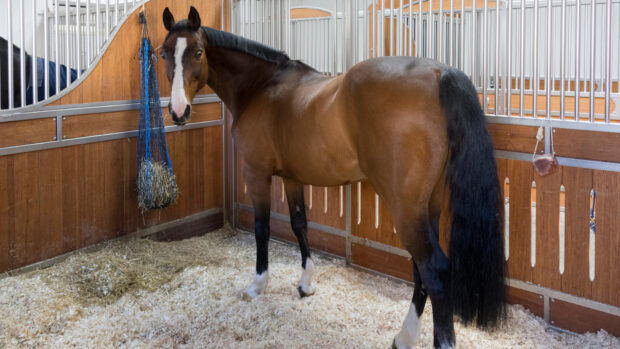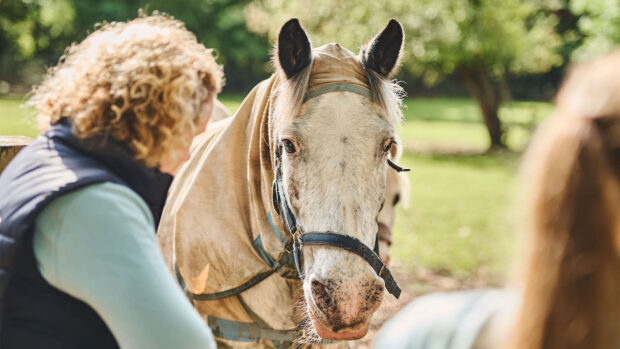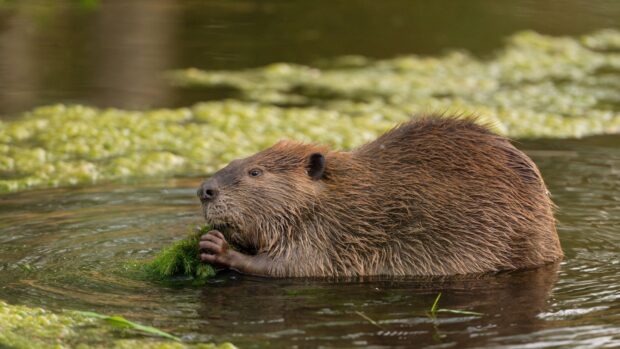Research on horses’ initial and longer-term reactions to startling objects could help identify genes associated with “spookier” horses, it is hoped.
Scientists at the University of Florida Institute of Food and Agricultural Sciences (UF/IFAS) have published a study on equine responses, as part of work that could identify genes that influence horses’ tendency to react in a certain way to, for example, flapping plastic bags.
“Identifying these genetic traits would be a first step toward one day selecting or breeding horses for the temperament types we prefer,” a university spokesman said. “These research results might be a decade away.”
In this peer-reviewed study, published in journal Genes, UF/IFAS professor of equine genetics Samatha Brooks and her team worked with a group of young horses who are part of the institute’s breeding program.
The horses wore heart–rate monitors and were turned out in a round pen. At set intervals, an umbrella was opened suddenly in the horses’ sight. The animals’ behaviour and heart rate were monitored during and after the initial startle reaction.
“We can’t read their minds,” said Professor Brooks. “Their heart rate tells us what is going on inside that we cannot see from reading their body language alone. It was interesting to see the stories their heart rates told us.”
The data showed there were two clear groups. One was startled by the umbrella, showing a spike in heart rate, then maintained a reactive or hyper-alert state afterwards, including more time spent looking at and moving away from the umbrella.
The second group startled in much the same way, with a heart-rate spike, but then “calmed quickly and carried on with their day”.
“These animals perceived the stimulus and found it startling but did not go through the behavioural patterns of avoidance, fear, etc. like the first group,” the spokesman said.
The team will now take the data and develop a study to investigate the genetic components that may influence how horses react to fear.
“Understanding each horse’s genetic make-up will help you understand the type of animal you need,” said Professor Brooks. “If we learn early on what this animal’s natural tendencies are most likely to be, we can make educated decisions on training and future careers to give the horse the best shot to grow into their potential, rather than becoming a problem or danger.”
Understanding a horse’s reaction to uncomfortable situations could also make a difference in how it is handled for transport and veterinary procedures.
“It’s important to know these traits because it can impact how we care for horses overall,” said Barclay Powell, a PhD student working on the project. “This will be hugely important to the veterinary field as well. It’s not only helpful for the people handling the animals, but also for the horses’ welfare.”
Professor Brooks added that whether it is a top sport horse, a therapy pony or pulling a carriage, an unplanned startle response can be an issue.
“We are just beginning to scratch the surface of this,” Professor Brooks said. “It might take us 10 years or more to really have a clear understanding, but it is worth the effort.”
You might also be interested in:

6 things only the owners of spooky horses will understand
Sara Walker explains what to expect if your horse is more ‘untamed explosion’ than ‘bombproof’...

Horses can discriminate between different letters, research finds

Subscribe to Horse & Hound magazine today – and enjoy unlimited website access all year round
Horse & Hound magazine, out every Thursday, is packed with all the latest news and reports, as well as interviews, specials, nostalgia, vet and training advice. Find how you can enjoy the magazine delivered to your door every week, plus options to upgrade your subscription to access our online service that brings you breaking news and reports as well as other benefits.




